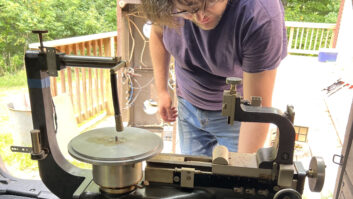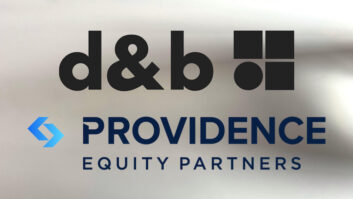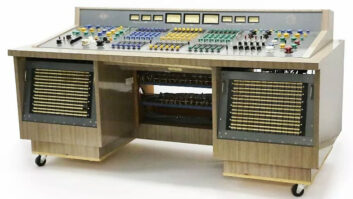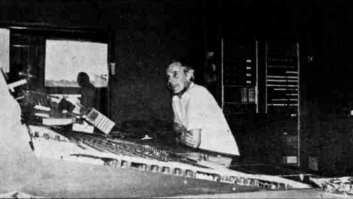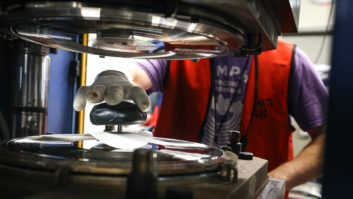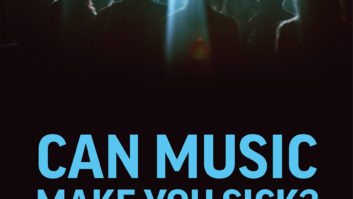
Mix readers know me as a career tech. I’m the geek who chats withelectrons. The job chose me a long time ago, and though I fought it fora while, being an engineer with tech chops opened some doors and becamea stepping stone into production. Well, sort of. Eight years into thatcareer path, I realized the importance of working with talent and beingselective. But recognizing and waiting for “good” projectsis a luxury — one that I could not afford at the time — soI accepted the road less traveled. It’s a lot less crowded during rushhour.
Instead of offering my usual tech tips and fixes, this month, Iinterviewed someone from my former life. Don Rose set out to create acool record company, achieved his goal and was willing to share hisperspective with us. I knew him in 1980 when he was president of EATRecords, a small Boston-based label with artists like Rubber Rodeo andHuman Sexual Response. Then, in 1983, he became president, CEO andco-founder of Rykodisc, which originally began as a CD-only label in1983. Born in 1955 (same as me) in Kalamazoo, Mich., and fourth cousinto Brian Epstein, Rose sold Rykodisc to Chris Blackwell’s Palm Picturesin 1998. Now out of the music business and pursuing another withsimilar passion, he’s got nothing to lose by speaking candidly.
For my own part, I don’t think there’s anything wrong with therecording industry that hasn’t always been wrong with it. This hasalways been a dirty business. Hardly the romanticized yellow-brickroad, it’s more like the artistic equivalent of buying a lotteryticket. (Keep in mind that the lottery is a tax on people who are badat math.) If you’re really looking for answers, bashing the recordcompanies is way too easy. Yes, they are dinosaurs who failed toembrace technology at a time when radio sucks. But, that said, considerthe saying, “Be careful what you wish for.” Our industryhas experienced an exponential technological growth combined withunbridled capitalism (now faltering from its own excesses). Many of usgrew up dreaming of the “record” model, but it’s broken nowjust like the corporate music-industry model. Affordable recordingtechnology allows a lot more players into the game, but that sametechnology also supports more games to be played.
There is plenty of activity in our industry: People buying recordinggear and/or studio time and putting out CDs. But a lot of what goes onis below the record company’s radar. That’s part of what the musicindustry is now: a hobby for people with day jobs. More people aremaking music, but fewer and fewer are making a living at it. Here’swhat Rose had to say about the state of the business.
So, you’re down on the music biz.
Yeah, I’m down on it. I have a bad attitude.
Give me your bad attitude bullets.
I think that all of this blame on digital downloading is not to thepoint. Although at the same time, I think that the industry’s failureto embrace and create a legal form of downloading is contributing to analready acute problem. The industry is not geared toward promotingmusic that really captures the public’s imagination. It’s become verycorporate and formulaic, and radio…
Is dead.
Exactly. Radio is not a partner in the industry. I think that themusic industry has continued to depend upon radio, but has ended uppandering to a medium that doesn’t care — to its owndetriment.
Do you think that the industry is basically pandering to the 12to 25 year olds?
Yeah. That’s a target demographic that radio chases and the musicindustry slavishly follows. At the same time, downloading is such acompelling, immediate and fun way to access music that it just blows mymind that the music industry is still trying to resist, fight andcontrol it rather than embrace, enhance and learn to derive revenuefrom it. They’d rather kill it first to prove that they have controland then turn around and figure out a way to dole it out to people.It’s a bankrupt philosophy.
Regarding peer-to-peer networking, do you feel that the cat’sbeen let out of the bag: that no one will want to pay for downloadedcontent?
No, I don’t believe that.
What if in the process of registering, by subscription or a lacarte, the user became part of the distribution process, kind of likeAmway meets the Discover Card?
Right, sure. Every time it changes hands, it triggers amicropayment.
Has this occurred to anyone?
Yes, it has, although not specifically the way you describe it.Digital-rights management, DRM, is a virtual architecture that allowseach licensee to dictate whatever the rules might be. For example, thefile can go out for free but expire in 30 days or can be passedone time, from one person to another, or the user can listen tothe first 30 seconds and if it’s the desired file, there’s an option tomake the micropayment.
There were a handful of DRM companies three or four years ago, themost established of which is Intertrust.com. It went public with a market cap ofa billion dollars at its peak and was purchased by Sony and Philips inNovember 2002. It’s an idea that the majors would desperately like tosee happen. I don’t know if the technology really works yet: if it’sfoolproof and un-hackable.
Why does everyone — consumers and artists — hate therecord companies?
The Industry’s at war. I think it’s about control. You can make allof the financial arguments that the industry has been shooting itselfin the foot, but it is an industry built on a foundation of ownershipand exploitation of intellectual property rights. Allowing peer-to-peernetworking and Silicon Valley companies to manage that part of theirbusiness requires them to give up control.
When I spoke to one record company executive, who wanted to stayoff the record, about cash flow, she said that it wasn’t a matter ofthe record companies losing money, but that they made less money. Inthe ’90s, there was so much growth, “irrational exuberance”in Greenspan-speak. Do you think it’s just economic reality that therecord industry has to downward-adjust its growth expectations?
Well, the record companies lose money in some quarters and hope tomake up for it in other quarters, like the holiday season.
Do you foresee the majors returning to the minimalist production,a la the current indie scene and 20-ish years ago with newwave?
I think that will be a component of the future: The industry willdownsize, though I don’t think it’s a solution for the majors. I dothink that the financial model and the distribution model are busted;it’s not just the fact that they’re spending too much, there are fewerpeople buying CDs. As you put it, consumers and artists dislike themajor labels. It’s a terrible business. Who wants to be at war witheverybody?
Has anyone ever done research to determine how many independentand vanity CDs are pressed vs. the number of CDs the majors are puttingout?
Well, I think it’s less. I think the whole business is contracting,no doubt about it.
So, what do you think will save the Music Industry?
Downloading is definitely on the rise, but not because it’s free— that’s probably third on the list — but because it’simmediate and the selection is virtually unlimited.
Selection is definitely not what radio’s about.
Right. People are still engaged; they still want music, but theywant a choice. So I say, just give the people what they want. It’s sosimple. We need a legitimate Napster or KaZaA, with a subscriptionmodel like cable television. All you can eat for a low monthly fee,plus gold, platinum and titanium membership — whatever. Quick,easy, inexpensive and legit. Once the proper economic relationship isestablished, all of the bells and whistles can be added.
Do you think that the record companies would consider rewardingcustomers who are, in essence, assisting in the distribution ofcontent?
I don’t know if the record companies would consider that. Even DRMadds a layer of friction. For all these years, the industry sales modelhas been unit-based, like selling bottled water. Now, it’s runningwater. Technology has changed the rules. Now, distribution is so mucheasier and consumer-friendly. With the exception of premium channels,you don’t pay for itemized programming on cable television. I thinkmusic access should be like that: the virtual jukebox in the sky,whether from a server or peer-to-peer.
You’re saying that the threshold for success is simplicity. Forme, that would be the compilations I get from my friend Bob. If radiowas less restricted, he’d be a very successful DJ.
They used to make A&R guys out of people like that and thenthey’d ruin them! Now, he can be Virtual Bob on the Internet.
What about the difference between the fees record companies andthe RIAA want to collect from Internet radio vs. traditionalradio?
It’s true and justified, but first you need to understand whyterrestrial radio pays music publishers but not the performance[recording]. The reason for the latter dates back to the second WorldWar. Back then, there were two broadcasting systems — Columbiaand RCA — and it boiled down to a performance fee exemption forone of the networks (I don’t remember which) to get their music played.The exemption eventually became the norm. Radio stations in any otherindustrialized country in the world pay both publishing and performance[record company] fees, but they are small. The online fees are very,very small: something like seven-tenths of a penny. The problem is thatthe advertising revenue for online services is not the same.
Now that you’ve left the messy music business behind, what areyou doing now?
I’ve always had a passion for classic cars, so I started a locating,brokering, import and export business. Just me, a laptop and a cellphone. I’m having a lot of fun doing that, as well as listening tomusic, making compilations, downloading music — even of CDs thatI own — because it’s faster than gathering them up and ripping;certainly easier than transferring vinyl. And, I’ve got a 14-year-oldson who is a downloading maniac, and I closely watch his habits.
“Tech’s Files” will be technical again nextmonth.
